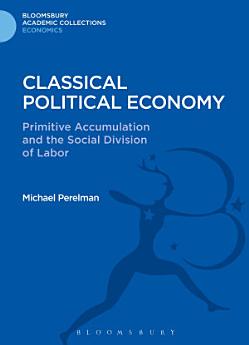Classical Political Economy: Primitive Accumulation and the Social Division of Labor
ພ.ຈ. 2013 · Bloomsbury Publishing
ປຶ້ມອີບຸກ
272
ໜ້າ
reportບໍ່ໄດ້ຢັ້ງຢືນການຈັດອັນດັບ ແລະ ຄຳຕິຊົມ ສຶກສາເພີ່ມເຕີມ
ກ່ຽວກັບປຶ້ມ e-book ນີ້
Classical Political Economy addresses the question of what determines the social division of labour, the division of society into independent firms and industries and develops the theoretical implications of primitive accumulation. It also offers a significantly different interpretation of classical political economy, demonstrating that this school of thought supported the process of primitive accumulation.
Classical political economy presents an imposing facade. For more than two centuries, the accepted doctrine dictates that a market generates forces that provide the most efficient method for organising production. This laissez faire approach is an ideology that gives capital absolute freedom of action, and yet called for intervention to coerce people to do things that they would not otherwise do. Classical political economy therefore encouraged policies that would hinder people's ability to produce for their own needs.
Michael Perelman, however, in this innovative take on the subject, seeks to challenge the ideologies that would allow things to continue in this line unchecked.
Classical political economy presents an imposing facade. For more than two centuries, the accepted doctrine dictates that a market generates forces that provide the most efficient method for organising production. This laissez faire approach is an ideology that gives capital absolute freedom of action, and yet called for intervention to coerce people to do things that they would not otherwise do. Classical political economy therefore encouraged policies that would hinder people's ability to produce for their own needs.
Michael Perelman, however, in this innovative take on the subject, seeks to challenge the ideologies that would allow things to continue in this line unchecked.
ກ່ຽວກັບຜູ້ຂຽນ
Michael Perelman is Professor of Economics at California State University, Chico, USA.
ໃຫ້ຄະແນນ e-book ນີ້
ບອກພວກເຮົາວ່າທ່ານຄິດແນວໃດ.
ອ່ານຂໍ້ມູນຂ່າວສານ
ສະມາດໂຟນ ແລະ ແທັບເລັດ
ຕິດຕັ້ງ ແອັບ Google Play Books ສຳລັບ Android ແລະ iPad/iPhone. ມັນຊິ້ງຂໍ້ມູນໂດຍອັດຕະໂນມັດກັບບັນຊີຂອງທ່ານ ແລະ ອະນຸຍາດໃຫ້ທ່ານອ່ານທາງອອນລາຍ ຫຼື ແບບອອບລາຍໄດ້ ບໍ່ວ່າທ່ານຈະຢູ່ໃສ.
ແລັບທັອບ ແລະ ຄອມພິວເຕີ
ທ່ານສາມາດຟັງປຶ້ມສຽງທີ່ຊື້ໃນ Google Play ໂດຍໃຊ້ໂປຣແກຣມທ່ອງເວັບຂອງຄອມພິວເຕີຂອງທ່ານໄດ້.
eReaders ແລະອຸປະກອນອື່ນໆ
ເພື່ອອ່ານໃນອຸປະກອນ e-ink ເຊັ່ນ: Kobo eReader, ທ່ານຈຳເປັນຕ້ອງດາວໂຫຼດໄຟລ໌ ແລະ ໂອນຍ້າຍມັນໄປໃສ່ອຸປະກອນຂອງທ່ານກ່ອນ. ປະຕິບັດຕາມຄຳແນະນຳລະອຽດຂອງ ສູນຊ່ວຍເຫຼືອ ເພື່ອໂອນຍ້າຍໄຟລ໌ໄໃສ່ eReader ທີ່ຮອງຮັບ.







